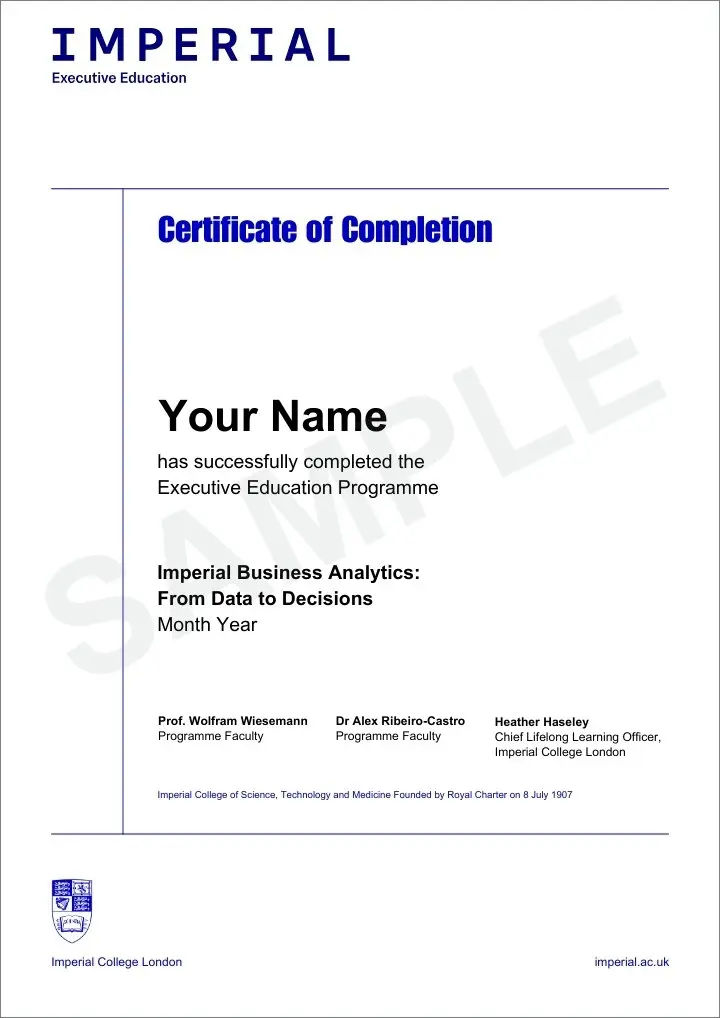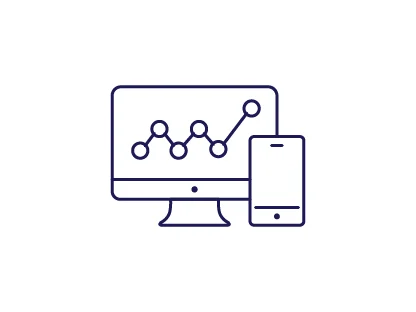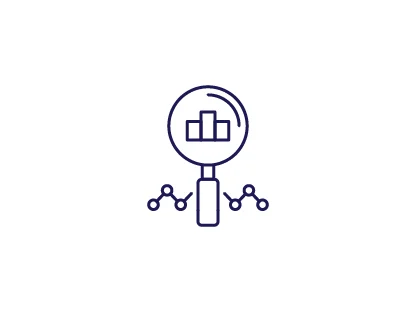
Imperial Business Analytics: From Data to Decisions
Why enrol for the Business Analytics programme?
Imperial Business Analytics: From Data to Decisions is an online programme brought to you by Imperial Executive Education. This immersive and interactive programme will:
- Take you through the fundamentals of the programming language Python to help you expand your understanding of business analytics
- It will teach you how to use descriptive, predictive and prescriptive analytics to identify, analyse and solve critical business problems
- It will help you understand and explore fundamental methods, frameworks and techniques of business analytics to make sense of your data and use it to make informed business decisions
You will draw on expertise from Imperial College Business School faculty, industry experts, case studies and your peers. You will also explore the practical applications of the analytical frameworks you are learning.
There is no prior programming knowledge required.
97%
74%
92%
Who is this programme for?
This international programme is designed for experienced professionals, including:
Technical managers implementing analytics in their function or organisation
Professionals seeking to enter into the field of analytics & data science
Mid-to-senior functional managers looking to improve their decision making using data
Consultants aiming to develop their knowledge of business analytics
The programme’s content and lessons are applicable across industries, including: banking and financial services, IT, healthcare, consulting, advertising, education, fast moving consumer goods, retail, and telecommunications.
Participant testimonials
Drive business decisions with

Meet the faculty

Professor of Analytics and Operations; Head of the Analytics, Marketing and Operations Department; Fellow, Imperial Business Analytics Centre Operations Management Department, Imperial College London
Wolfram Wiesemann is a professor of analytics and operations as well as the head of the Analytics, Marketing and Operations department at Imperial College Business School. In ...

Data Scientist
Alex holds an advisory position linked to the Business Analytics MSc and is an occasional guest lecturer for Executive Education. He also works as a quantitative analyst for t...
What you will learn
Learn the basics of statistics and probability, including theory and models, Bayes’ rule, conditional probability, probability distribution, binomial distribution, central limit theorem, and manipulating normal variables.
Gain an overview of operating systems; use variables in Python; create and manage lists; understand tuples and dictionaries in Python; delve into Boolean and conditional variables; expand your knowledge of functions, and work on code manipulation.
Evaluate data for business decisions; estimate statistics of a data set and maximum likelihood; learn detection and quantification of correlation; understand outliers and linear regression, and discover how these concepts are used in real-life applications.
Dive into machine learning; understand supervised learning; compare forecasting vs. inference; use nearest neighbors for classification; predict outcomes using regression trees; classify data using support vector machines; measure the similarity of data clusters, and predict outcomes for different clusters.
Build your knowledge of linear programming by tackling problems of optimisation, production planning, and capital budgeting; identify constraints and the optimal solution; model business problems as linear programmes; learn tricks of the trade.

Certificate
Upon completion of the programme, participants will be awarded a verified Digital Certificate by Imperial Executive Education.
Note: You will earn the Associate Alumni status upon successful completion of the programme. Visit the Associate Alumni page to find out more.
FAQs
How do I know if this programme is right for me?
After reviewing the information on the programme landing page, we recommend you submit the short form above to gain access to the programme brochure, which includes more in-depth information. If you still have questions on whether this programme is a good fit for you, please email learner.success@emeritus.org, and a dedicated programme adviser will follow up with you very shortly.
Are there any prerequisites for this programme?
Some programmes do have prerequisites, particularly the more technical ones. This information will be noted on the programme landing page, as well as in the programme brochure. If you are uncertain about programme prerequisites and your capabilities, please email us at learner.success@emeritus.org for assistance.
What are the requirements to earn a certificate?
This is a graded programme. You will be required to complete a combination of individual assignments, quizzes, and a final project. Each component carries a certain number of points and a cumulative score of 75% is required to pass and obtain your professional certificate.
Will I be guaranteed a job upon completion of the programme?
The primary objective of this programme is to give you the skills you need to be prepared for a job in this field. While eligible participants will receive career coaching and support and may receive introductions to our hiring partners, job placement is not guaranteed.
How much time will I be expected to devote to this programme?
Each programme includes an estimated learner effort per week. This is referenced at the top of the programme landing page under the Duration section, as well as in the programme brochure, which you can obtain by submitting the short form at the top of this web page.
How will I spend my time in this programme?
You will divide your learning time between viewing recorded coding demos, video lectures, contributing to class discussions, completing assignments, projects, and knowledge checks, and attending optional live sessions with industry experts and programme leaders.
How is the programme administered? Can the programme be accessed anytime?
The programme is accessed through the custom learning portal. This portal will give you access to all programme-related content such as video lectures, assignments, and discussions. Live office hours will be conducted using a webinar tool. The video lectures and assignments are accessible weekly throughout the programme. In the event you miss a live session, a recording will be made available.
Do I need to attend live sessions every week?
Faculty video lectures are recorded, allowing you to watch these on your own schedule. However, participation in optional live sessions and discussion boards is highly encouraged. Live sessions will give you the opportunity to draw on the coding experience of our industry-experienced course leaders to answer your questions and help reach your learning goals. The discussion boards are also an integral part of the learning experience, giving you and your peers the opportunity to learn together, along with guidance from the moderators.
Can I download the programme videos?
You can download video transcripts, assignment templates, readings, etc. However, the video lectures are only available for streaming and require an internet connection.
How do I interact with other programme participants?
You can communicate with other participants through our learning platform. You will be able to form groups based on your interests and location. A direct messaging feature is also available through the platform.
What is it like to learn online with the learning collaborator, Emeritus?
More than 300,000 learners across 200 countries have chosen to advance their skills with Emeritus and its educational learning partners. In fact, 90 percent of the respondents of a recent survey across all our programmes said that their learning outcomes were met or exceeded. All the contents of the course would be made available to students at the commencement of the course. However, to ensure the programme delivers the desired learning outcomes the students may appoint Emeritus to manage the delivery of the programme in a cohort-based manner the cost of which is already included in the overall course fee of the course. A dedicated programme support team is available 24/5 (Monday to Friday) to answer questions about the learning platform, technical issues, or anything else that may affect your learning experience.
What are the requirements to earn the certificate?
Each programme includes an estimated learner effort per week, so you can gauge what will be required before you enrol. This is referenced at the top of the programme landing page under the Duration section, as well as in the programme brochure, which you can obtain by submitting the short form at the top of this web page. All programmes are designed to fit into your working life. This programme is scored as a pass or no-pass; participants must complete the required activities to pass and obtain the certificate of completion. Some programmes include a final project submission or other assignments to obtain passing status. This information will be noted in the programme brochure. Please contact us at learner.success@emeritus.org if you need further clarification on any specific programme requirements.
What type of certificate will I receive?
Upon successful completion of the programme, you will receive a smart digital certificate. The smart digital certificate can be shared with friends, family, schools, or potential employers. You can use it on your cover letter, resume, and/or display it on your LinkedIn profile. The digital certificate will be sent approximately two weeks after the programme, once grading is complete.
Can I get the hard copy of the certificate?
No, only verified digital certificates will be issued upon successful completion. This allows you to share your credentials on social platforms such as LinkedIn, Facebook, and Twitter.
Do I receive alumni status after completing this programme?
No, there is no alumni status granted for this programme. In some cases, there are credits that count toward a higher level of certification. This information will be clearly noted in the programme brochure.
How long will I have access to the learning materials?
You will have access to the learning platform and all programme materials (videos excluded) for one full year following the programme start date. Access to the learning platform is restricted to registered participants per the terms of agreement.
What equipment is needed or the technical requirements for this programme?
To successfully complete this programme online, you must have access to a device meeting the minimum requirements, found here. In addition, Microsoft Office or similar product and a PDF viewer are required to access documents, spreadsheets, presentations, PDF files, and transcripts in all programmes. Please check the learning platform on the first day of class.
Do I need to be online to access the programme content?
Yes, the learning platform is accessed via the internet and video content is not available for download. You can download files of video transcripts, assignment templates, readings, etc. Video lectures must be streamed via the internet and webinars and small group sessions will require an internet connection.
What is the programme fee for the programme and what forms of payment do you accept?
The programme fee is shown at the top of this page.
Flexible payment options, group enrolment benefits and referral bonus are available.
Tuition assistance may be available for participants who qualify. Please contact your programme adviser to discuss.
What if I don’t have a credit card – is there another mode of payment accepted?
Yes, you can do the bank remittance via wire transfer. Please contact your programme adviser for more details.
Is there an option to make flexible payments for this programme?
Yes. Flexible payment options are available for this programme. We partner with loan partners to offer you flexible and transparent loan options. More information about loan financing is available here. Installment payments are also available—you can find the options here.
Does the programme fee include taxes? Are there any additional fees?
Yes, the programme fee is inclusive of any taxes with the exception of GST for Singapore residents.
Who will be collecting the payment for the programme?
Emeritus collects all programme payments, provides learner enrolment and programme support, and manages learning platform services.
Are there any restrictions on the types of funding that can be used to pay for the programme?
Programme fees for Emeritus programmes with Imperial Executive Education may not be paid for with (a) funds from the GI Bill, the Post-9/11 Educational Assistance Act of 2008 or similar types of military education funding benefits or (b) Title IV financial aid funds.
What is the programme refund and deferral policy?
For the programme refund and deferral policy, please click the link here.
Didn't find what you were looking for? Write to us at learner.success@emeritus.org or Schedule a call with one of our Programme Advisers or call us at +44 208 629 1765 (UK) / +1 315 509 2976 (US) / +65 3138 2451 (SG)
Flexible payment options available.
Starts On












